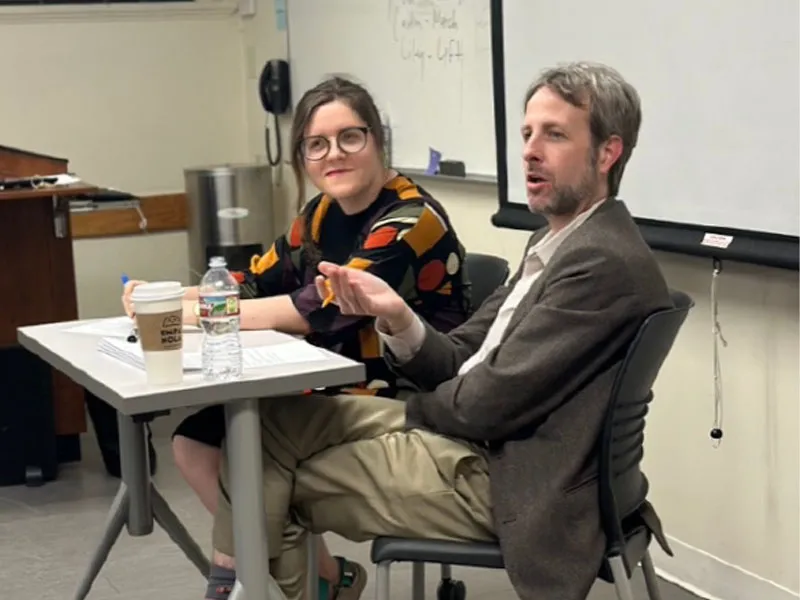
This semester, students in Assistant Professor of Communication Muira McCammon’s Emerging Tech and Internet Law class had the opportunity to put learned concepts to the test, playing out the roles of tech CEOs, PR strategists, concerned citizens, journalists, and protestors in a mock Congressional hearing. With the help of a grant from Tulane’s Center for Engaged Learning and Teaching, Professor McCammon was able to invite special guest Matthew Conaty, former Assistant U.S. Attorney and Chief of the Federal Communications Commission's Spectrum Enforcement Division, to campus for the proceeding. In their roles as U.S. Senators from both sides of the aisle, McCammon and Conaty led the line of questioning against tech companies like Facebook, PayPal, X, Microsoft, Match Group (Tinder and Hinge), and Lyft, allowing students to reckon with the realities of regulatory oversight facing Silicon Valley.
Students serving as tech CEOs of these companies were given a brief 15-minute window to prepare themselves before testifying. Their task was clear: to craft a concise 1 - 1.5-minute opening statement that addressed the controversies of their respective companies. Each CEO had to outline what had transpired and lay out their company’s planned course of action to rectify the situation. A group of six students named as dedicated public relations professionals helped CEOs refine their statements, ensure accuracy, and provide real-time fact-checking support by passing notes and information — allowing CEOs to think “on the fly”, and craft well-informed responses that would resonate with the Senators and shareholders alike.
“From a personal perspective, I would say ‘Yeah, I can see how those claims would be warranted,’” said student Caitlin Caulfield, who played a Match Group CEO facing accusations regarding gamification, and use of addiction-inducing tactics, on platforms Hinge and Tinder. “However, as Ally [PR team member] and I dove more into the case law it was interesting to see Match’s defense essentially being ‘these claims are illegitimate.’”
Other students acted as angry members of the public, representing users of each company’s product. They were given the chance to voice concerns and pose questions to each CEO, directly engaging with issues that had affected them personally.
“This was very fun to act out as tech CEO as I love toying with extremes,” said Caulfield. “I will be interested to see how this case develops and whether or not it will turn class action.” Aside from Match, other cases involved Lyft and disabled passenger discrimination, Microsoft and AI regulation, PayPal’s hidden fines, and several claims against X and Facebook.
In the midst of the hearings, four “journalists” diligently observed and documented the proceedings. They were granted the opportunity to interview affected citizens, the Senators and their aides, and the tech CEOs themselves. The assigned student op-ed writer, although not directly involved in the hearings, had a critical role in shaping the narrative, as their analysis and argument for regulatory or legal solutions would contribute to the ongoing court of public opinion — and the larger conversation on responsible tech practices. Rounding out the student roles was a photographer documenting the entire affair and even a secret protester.
“Pedagogically, legal roleplay gives students a window into the real-time stresses that tech companies face,” Professor McCammon shared. “It also allows them to develop a vocabulary to discuss contemporary issues in Internet policy.”
Enabling students to experience legal proceedings from a variety of perspectives, especially in an area as controversial and ever-changing as emerging tech and internet law, allowed them to take in the nuances and complications of materials covered in their course. The exercise highlighted the importance of transparency, responsibility, and the need for effective communication in the tech world, and undoubtedly helped shape the students' future outlook on critical issues of media rhetoric and internet law.

